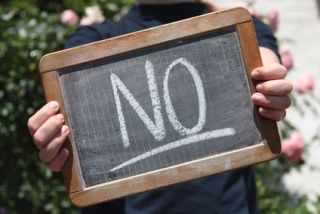Health
Is Getting Sick the Way You Say "No"?
If you can't say no, your body often starts doing it for you
Posted August 20, 2012

A few weeks ago I was brought in to speak to the staff of a local university. I gave a two hour workshop, which is even more fun for me than giving a keynote as I get to interact personally with the audience and draw their stories out.
One of the sections of the workshop was about listening to your body. Every person’s body “speaks” to them in a different way; it’s important to pay attention to and learn to understand and interpret your body’s language.
When your life is off track, your body will let you know. It starts small, whispering to you through minor ailments such as suddenly developing a rash like eczema, or getting mild tension headaches. If you don’t pay attention and make adjustments it will get louder. You might start catching every cold that’s around, or end up with pneumonia.
This isn’t to say that you necessarily caused any and every medical condition you might end up with; there will always be some health situations that we have no explanation for. Yet there’s no question that when you’re out of balance in your life it’s perceived by your body as a stressor, and that can lead to all kinds of secondary consequences (and physical alarm bells). It's essential to pay attention to this.
While speaking at that university, I asked the audience members if they had any examples of a time their body let them know that something in their life had to change. A small, pleasant-faced woman raised her hand.
“I got diabetes,” she told us. “There’s absolutely no history of it in our family. It was purely due to stress.”
Chronic excess stress could trigger diabetes in a variety of ways: reaching for sugary snacks or other poor food choices to temporarily calm and comfort; lack of time to exercise and maintain a healthy weight; being chronically sleep-deprived (even brief sleep deprivation triggers a pre-diabetic state); or having constantly elevated stress hormones that raise blood sugar.
I asked her what the circumstances were that had made her life so stressful.
“I’m a victim of the sandwich generation,” she said. “I was taking care of my kids, my parents, and everybody else. When I got diagnosed with diabetes, I knew something had to change. I was the person who everyone else came to for Thanksgiving, Christmas, everything. The year I got my diagnosis I told them that if they wanted to eat turkey they could make it themselves, I wasn’t lifting a finger. They didn’t like it at first, but I had no choice. Everything’s so much better now. I made lots of positive changes that were way overdue, and my blood sugar has gone back to normal.”
Why do so many of us have to get sick before we feel we have the right to claim a sane life? Before we feel we can rightfully say no?
For my mother, it took having breast cancer in her forties to finally assert her right to some alone time and her own interests. I see this all the time – people spend their whole life longing to make a certain major change, and are only able to do it once a diagnosis of cancer gives them permission (and pressure) to finally act. After all, when you have cancer who would deny you a chance at happiness, or better health, or your dreams? Using cancer as your permission slip is better than never doing what you long to do. But still.
I’ve done it too. On many occasions I’ve committed myself to something I don’t really want to do (or don’t have time to do), and have actually been relieved and even happy when I woke up “the day of” with a fever or flu and was able to beg off. It took severe depression (and a related stress leave) for me to leave a job I hated and pursue the vocation of my dreams.
I still say an enthusiastic “yes” to things much too easily, especially if the date is far away. For example, I had booked dinner with a friend recently, for the day after I finished hosting a seven hour retreat for women. I also had some phone appointments booked that day.
What was I thinking? I loved giving the retreat, but after the intense effort (not to mention the month of build-up), I should have anticipated that I’d need several days off after to recover. I had never spoken for that many hours, so I didn’t know just how wiped I’d be after – but still. Not surprisingly, I developed a massive headache the next day, enabling me to beg off dinner and just stay home. I would have had a much harder time just telling her I didn't want to go out that night after all.
Do you rely on your body to say no for you when you can't? How has this manifested itself in your life?
Look at the occasions or situations that this has happened. Can you see a pattern?
Are you part of this problem, too? Do you make it hard on your friends if they cancel with you because they really need a quiet night at home”? Do you let them off more easily if they have a “valid” excuse such as being sick?
Before you commit to something or agree to take on a new responsibility, gauge how you truly feel about doing it and whether you actually have room in your life. Would you be better off keeping that night or weekend free, instead? Will you kick yourself later if you say yes now? You CAN NOT do everything. No matter how much people may want you to, or applaud you for it.
I would love to hear your experiences – how has your body said “no”? What are you going to start saying no to, without needing or waiting for a physical excuse?
Dr. Susan Biali, M.D. is a medical doctor, health and happiness expert, life and health coach, professional speaker, flamenco dancer, and the author of Live a Life You Love: 7 Steps to a Healthier, Happier, More Passionate You, dedicated to helping people worldwide get healthy, find happiness and enjoy more meaningful lives that they love. Dr. Biali is available for keynote presentations, workshops/retreats, media commentary, and private life and health coaching—contact susan@susanbiali.com or visit www.susanbiali.com for more details.
Connect with Dr. Biali on Facebook, Twitter, and LinkedIn
Copyright Dr. Susan Biali, M.D. 2012




